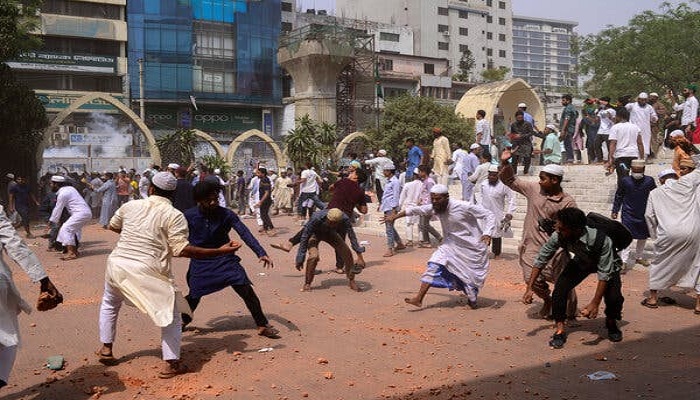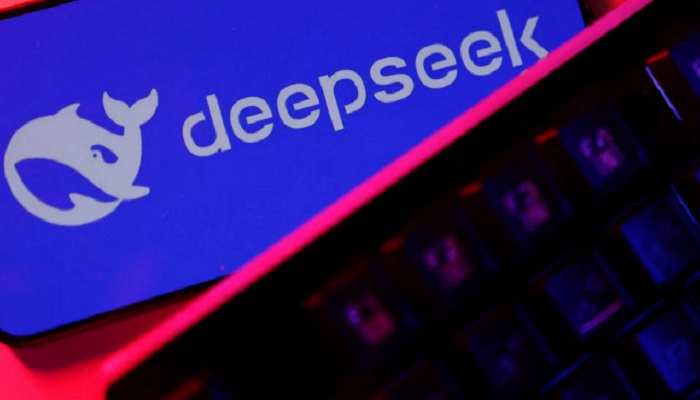More than a dozen people injured after clashing with police after a two-day visit by India’s Prime Minister Narendra Modi.
At least a dozen people have been reported injured in clashes between police and demonstrators in Bangladesh, as violence spread across the country on the third day of protests against the visit of India’s Hindu-nationalist leader.
Protesters also on Sunday reportedly attacked Hindu temples and a train in eastern Bangladesh.
Five people had died on Friday, and another six on Saturday, after police shot at demonstrators in several major districts across the Muslim-majority nation of 168 million people.
Cow Science exam postponed in India amid ‘controversy over syllabus’
The protesters mostly from the Hefazat-e-Islam group were angry at the visit of Indian Prime Minister Narendra Modi, who they accuse of stoking communal violence against Muslims in his country.
Modi was in Bangladesh to attend its Golden Jubilee celebrations of independence and the birth centenary of Sheikh Mujibur Rahman, the country’s founder and father of current Prime Minister Sheikh Hasina.

Modi Visits brought violent protest in Bangladesh, dozens injured :File Photo
On Sunday, Hefazat activists allegedly attacked a train in the eastern district of Brahmanbaria, resulting in 10 people being injured.
“They attacked the train and damaged its engine room and almost all the coaches,” one police official said, declining to be named as he was not authorised to speak to the media.
Javed Rahim, a journalist in the Brahmanbaria town, told Reuters news agency by phone: “Brahmanbaria is burning. Various government offices were set on fire indiscriminately. Even the press club was attacked and many injured, including the press club president. We are in extreme fear and feeling really helpless.”
Amazon appeal get response as Indian SC halts Mukesh Ambani retail deal
Several Hindu temples in the town were also attacked, he said.
Protesters allegedly also set alight two buses in the western district of Rajshahi on Sunday.
At one new protest in Narayanganj just outside the capital, Dhaka, Hefazat supporters chanted “action, action, direct action” as they blocked the key highway linking Dhaka with the port city of Chittagong.

Hundreds of demonstrators clashed with police, and burned furniture and tyres on the roads as they chanted anti-Modi slogans and called on authorities to investigate police shootings.
Police fired tear gas and rubber bullets after the protesters barricaded parts of the highway. A police spokesman told AFP news agency they had since left the road.
Hefazat spokesman Jakaria Noman Foyezi on Sunday told AFP that thousands of its supporters joined demonstrations at its headquarters at Hathazari outside Chittagong, which is home to a top Islamic seminary.
“Police opened fire on our peaceful supporters,” the group’s organising secretary Azizul Haque told a rally in Chittagong a day earlier. “We will not let the blood of our brothers go in vain.”
India approves emergency use of two coronavirus vaccines
The Islamist group has a nationwide network, and it has held large protests in the past demanding that Bangladesh introduce blasphemy laws.
Protests were also held in the northeastern city of Sylhet, the eastern district of Brahmanbaria and in Bosila, a Dhaka suburb, but there were no reports of violence, local media reported.
As Bangladesh celebrated independence, human rights groups criticised the government for what they described as growing authoritarianism, including forced disappearances and extrajudicial killings.
Other groups including students, leftists and other Islamist outfits had also staged protests against Modi’s visit on Friday and Saturday.
“The right to peaceful protest has come under concerted attack, particularly during the coronavirus pandemic, culminating in this type of bloody repression,” Sultan Mohammed Zakaria Amnesty’s South Asia researcher, said in a statement.
India Supreme Court set up panel to end farmers’ protest
Modi left the country on Saturday after holding talks with Bangladesh Prime Minister Sheikh Hasina and gifting the country 1.2 million COVID-19 vaccine shots.
The two countries issued a joint statement celebrating their cooperation and partnership but the Bangladesh government did not comment on the protests.



